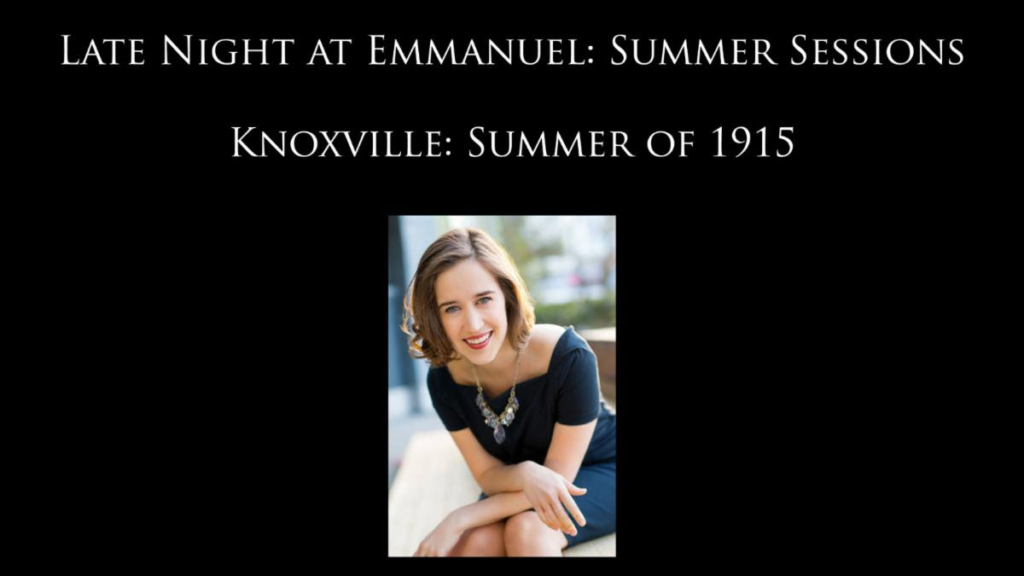 Soprano/Vocals by Sarah Moyer
Soprano/Vocals by Sarah Moyer
Piano by Timothy Steele
Artistic Direction by Ryan Turner
Composed by Samuel Barber
Based on prose poem by James Agee
Emmanuel Music
15 Newbury Street
Boston, MA 02116
YouTube
Review by Gillian Daniels
ZOOM — You are here and you are not here. You are waiting in your bedroom for your next Zoom meeting to start, you are in the shower taking fifteen minutes for yourself away from your kids, or you are putting on your mask, ready to head into work where you’re considered essential staff, but not essential enough for customers to remember to wear their masks when you take their order.
Simultaneously, your mind is thinking about your family road trips to Iowa, the raucous laughter of your friends in eighth grade, and traveling, once, to Paris. It’s been months since you’ve seen your family all in one place. You’re in your body, living through a strange time and a terrifying plague, simultaneously overwhelmed and bored while sitting in your room for the ninth hour in a row, feeling the spray from the showerhead, or sitting as far as you can from other masked people on the T, some of whom let their masks sit beneath their nostrils because, apparently, the smell of the train is that important. But you’re also encapsulated in your memories.
You are inside a refuge of the mind, the kind Knoxville: Summer of 1915 invokes with Sarah Moyer’s voice and the parred down instrumentation of Timothy Steele. Knoxville: Summer of 1915 is performed as part of a series called Summer Sessions from Emmanuel Music.
In the introduction, Moyer talks about how James Agee wrote this piece in 1938, setting it the year before his father’s untimely death. Composer Samuel Barber, too, was dealing with the passing of a parent. “Their response to loss, to something awful,” says Artistic Director Ryan Turner during his recorded conversation afterward with Sarah Moyer, “is nostalgia.”
The story itself, such as it is, is not exactly challenging material. It’s less of a “story,” even, than a melting of words into a golden recollection of a Tennessee summer. It’s experimental in how it marries music with a non-rhyming tone poem, yet serene, even traditional in execution. This is a piece built from Americana, horses and buggies, images of streetcars with their “bleak spark crackling and cursing above [them] like a small malignant spirit set to dog [their] tracks,” and “parents on porches” who “rock and rock.” It’s a collection of raw sense memory, unrevised.
The climax, I think, is when Agee writes, and, now, Moyer sings, of the miracle of one’s family all living at the same time, being united in the same place: “By some chance, here they are, all on this earth; and who shall ever tell the sorrow of being on this earth, lying, on quilts, on the grass, in a summer evening, among the sounds of the night.” What a miraculous realization that it’s only coincidence, chance conceptions many times over, the accidental placement of continents and drawing of nations, that we exist at all, with each other, in any given place rather than not exist at all.
The music and Moyer’s soaring voice is a languid dream. If there’s a conflict in the piece, it comes in the final lines, where the speaker finds he is “one familiar and well-beloved in that home: but will not, oh, will not, not now, not ever; but will not ever tell me who I am.” He is a child and, therefore, to the speaker, an incomplete adult, still growing, still becoming, and, one day, ready to leave the town of his youth to find himself.
I was surprised to realize the piece itself is about fifteen minutes long. While it did not move me to tears, it introduced a soothing, clear moment of introspection into my day.
In the conversation between Moyer and Turner that follows the performance, Moyer discusses using lockdown to, among other things, learn the music for Knoxville because it’s a “bucket list item” and has been keeping her in “vocal health.” Turner talks of the “slowing down” of the world.
Moyer, to my surprise, had not previously collaborated with musician Timothy Steele, whose sharp, clear playing compliments her voice so well. They talked over the phone and, later, Moyer sang to a recording of Steele on the piano. The recording was then posted online.
We make art in lockdown, during the most unlikely of times, because it’s important the way memories and nostalgia is important. Many of us define ourselves by it. We are here, in a physical world that doesn’t meet our expectations, but we are not here, escaping inward. Like Knoxville, we lack a single plot, but instead are in the midst of a slowing down, a crawl of summer that, once in a while, ensconced in memories, proves sweet.
